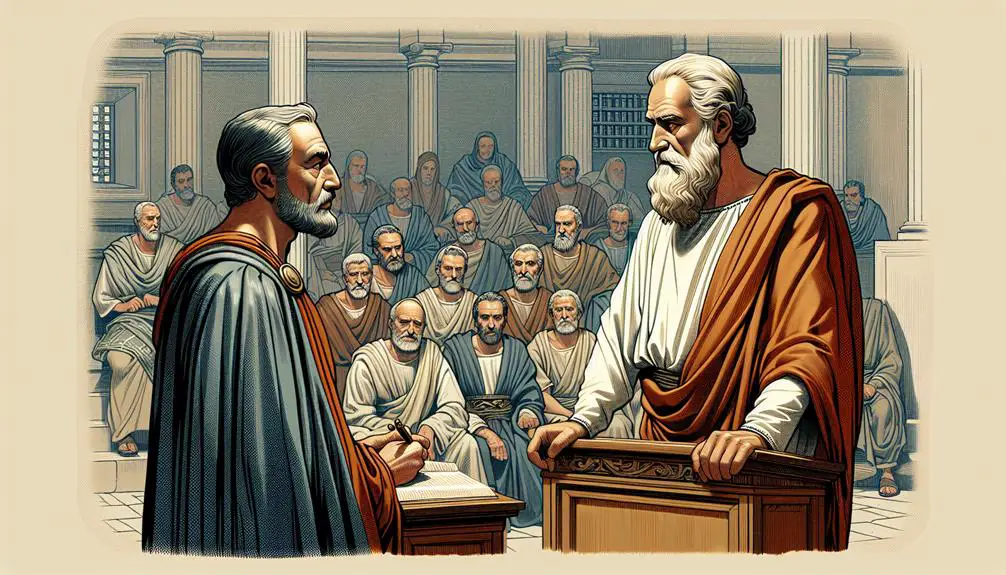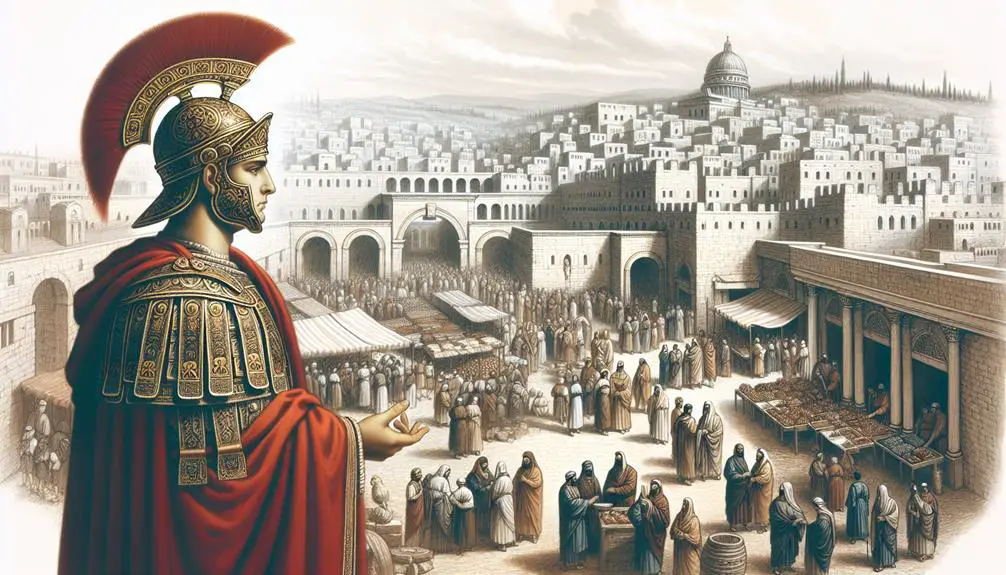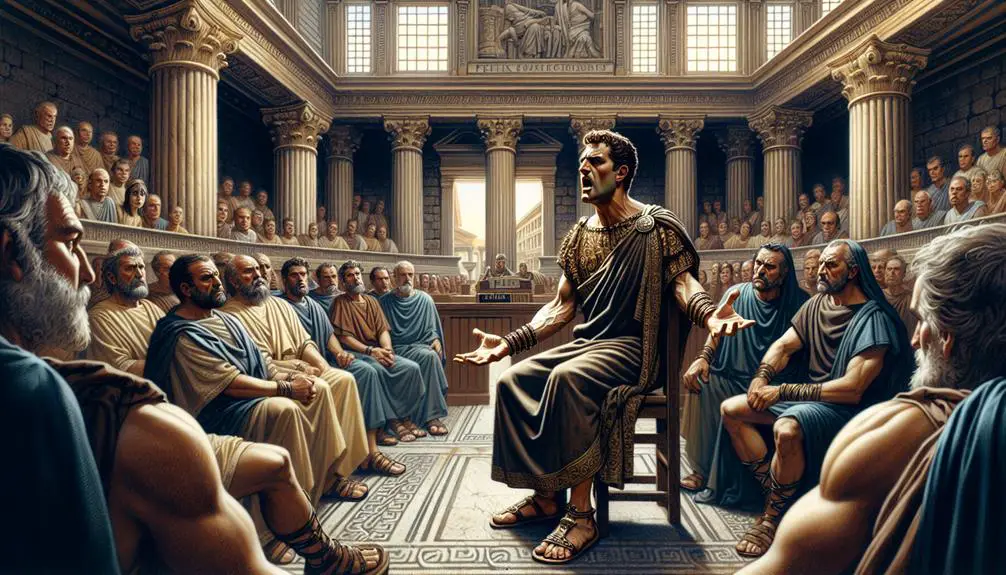Discover how Felix, a Roman procurator, played a pivotal role in the early Christian Church, influencing key events and figures like Apostle Paul.

Felix in the Bible
You've likely heard of prophets, disciples, and kings in the Bible, but what about the rulers who interacted with these figures? Marcus Antonius Felix, commonly known as Felix, is one such individual whose role as procurator of Judea intersects significantly with the early Christian community and the Apostle Paul.
His governance, fraught with controversy and political maneuvering, sets the stage for a trial that not only impacted Paul's ministry but also left an indelible mark on the course of early Christianity. If you're intrigued by the blend of political intrigue and religious history, Felix's story offers a compelling glimpse into the complexities of biblical narratives and the historical figures within them.
Let's explore how his actions and decisions influenced the tumultuous period of the early Christian Church and consider what lessons can be drawn from his tenure.
Key Takeaways
- Felix's encounter with Apostle Paul highlights the interplay of legal, religious, and political dynamics in Roman Judea.
- His governance and trial procedures reflect the complexities of Roman law and administration during his tenure.
- Felix's interactions with early Christians, including Paul, influenced Christian thought and early church-state relations.
- Archaeological discoveries provide insights into Felix's era, contributing to our understanding of biblical narratives and historical context.
Historical Background of Felix

Marcus Antonius Felix, commonly known as Felix, served as the Roman procurator of Judea from AD 52 to 58, a period marked by increasing tensions and unrest. His tenure, while significant for its political and social implications, also offers insights into the complexities of Roman governance and the intricate web of familial and marital alliances that often underpinned Roman authority in the provinces.
You'll find Felix's Roman lineage and marital alliances particularly telling of the era's dynamics. Coming from a background of freedmen, Felix's rise to power wasn't only a testament to his personal ambitions and capabilities but also to the Roman practice of leveraging loyal servitude into positions of influence. His brother, Pallas, wielded considerable influence in the Roman court, which likely facilitated Felix's appointment.
Moreover, Felix's marital alliances underscore the strategic relationships that often played a critical role in consolidating power. He was married three times, notably to Drusilla, a daughter of Herod Agrippa I, which linked him to the Herodian dynasty. This alliance through marriage illustrates the interweaving of Roman and local elites, a tactic that Rome often employed to ensure loyalty and stability in its provinces.
Felix's Role as Procurator

Understanding Felix's ascent and his strategic marital ties offers a foundation to examine his tenure as the Roman procurator of Judea, a role fraught with challenges and marked by his distinct approach to governance. Felix's marriage not only solidified his political alliances but also influenced his administrative strategies within the complex landscape of Roman governance. His tenure, characterized by a pragmatic yet often harsh rule, reflects the broader strategies Rome employed in its provinces to maintain control and enforce peace, often through intimidation and force.
Felix's approach to governance was multifaceted, leveraging his marital connections to navigate the intricacies of local politics and Roman expectations. His administration was marked by efforts to suppress dissent and manage the diverse and sometimes volatile religious and cultural dynamics of Judea. However, his tenure also highlighted the challenges faced by Roman procurators in balancing the demands of imperial authority with the realities of local governance.
In analyzing Felix's role as procurator, it's essential to consider how his personal ambitions and relationships, particularly his marriage, intersected with the broader mechanisms of Roman governance. This intersection offers insights into the complexities of Roman provincial administration and the personal dimensions that could influence political and military strategies.
Encounter With Apostle Paul

You'll find that Felix's encounter with Apostle Paul marks a crucial juncture in biblical history. This encompasses their initial meeting, the trial that Paul faced before Felix, and Felix's subsequent procrastination.
This sequence of events not only illuminates Felix's character but also provides insight into the judicial practices of the time. Analyzing these points allows for a deeper understanding of the complexities and nuances within these interactions.
Felix Meets Paul
One pivotal moment in Christian scripture is when Felix, the Roman governor, encountered the apostle Paul, marking a significant interaction that would later influence theological interpretations and discussions. This encounter didn't occur in ordinary circumstances but followed Paul's shipwreck on his way to Rome, where he was to stand trial.
Felix's ancestry, being of Greek descent and having risen through the Roman administrative ranks to govern Judea, added layers of cultural and political complexity to their meeting. This backdrop is crucial in understanding the dynamics at play during their encounter. Analyzing this meeting sheds light on the intricate interplay of power, faith, and providence, offering a rich field for theological and historical examination without delving into the subsequent trial before Felix.
Trial Before Felix
The trial of the Apostle Paul before Governor Felix not only marks a crucial juncture in biblical history but also unveils the complex interplay between Roman legal practices and early Christian beliefs. You'll see how the proceedings reflect:
- A clear depiction of Roman law in action
- Legal procedures tailored to manage provincial unrest
- The strategic use of defense by Paul, leveraging his Roman citizenship
- Felix's role as a Roman governor adjudicating a religious dispute
- The broader implications of this trial on Christian legal thought
The trial before Felix is a fascinating case study of how legal, religious, and political elements intertwine under the auspices of Roman governance, offering insights into the judicial mechanisms at play and their impact on emerging Christian communities.
Felix's Procrastination
Felix's encounter with Apostle Paul showcases a notable instance of judicial hesitation, reflecting broader themes of governance and accountability within the Roman legal system. This episode serves as a classic example of decision paralysis, where Felix, despite numerous hearings, defers making a definitive judgment on Paul's case. This indecision underlines a reluctance to take a firm stance, possibly due to political considerations or personal uncertainty.
Analyzing this behavior reveals insights into the complexities facing leaders when confronted with challenging decisions. Moreover, modern parallels can be drawn with current judicial and governance systems, where similar instances of procrastination and avoidance of accountability are observed. Such parallels underscore the timeless nature of decision-making challenges in positions of authority.
Trial of Paul by Felix

In examining the trial of Paul by Felix, it becomes evident that this legal proceeding highlights the complexities of governance and justice in ancient Rome. You'll notice that this trial wasn't just about determining Paul's guilt or innocence; it was a display of the legal intricacies and political maneuvers within the Roman judicial system.
Paul's defense stands out as a critical element in understanding the trial. He adeptly navigates the accusations against him, leveraging his knowledge of Jewish law and Roman citizenship. This case sheds light on the sophisticated legal framework of the time and the rights afforded to Roman citizens, regardless of their provincial origins.
To grasp the significance of this trial, consider the following points:
- Paul's articulate defense against accusations of sedition and blasphemy
- The legal rights of Roman citizens under trial
- The role of witnesses and accusers in Roman legal proceedings
- Felix's position and authority as the presiding judge
- The intersection of Roman law and Jewish customs
Analyzing these aspects, you gain an appreciation for the intricacies of Paul's trial by Felix, highlighting the broader themes of justice, governance, and legal rights in ancient Rome.
Felix's Political Maneuvers

Delving into Felix's tenure as procurator, one observes a strategic blend of political cunning and judicial pragmatism aimed at maintaining his power and managing the volatile Judean province. You'll find his approach was multifaceted, leveraging Felix's alliances and economic policies to cement his authority and placate Rome while navigating the local socio-political landscape with a deft hand.
Aspect |
Strategy |
Outcome |
|---|---|---|
Felix's Alliances |
Formed ties with influential Jewish leaders and Roman officials |
Ensured political support and stability |
Judicial Pragmatism |
Utilized trials and hearings to assert control |
Maintained order and deterred dissent |
Economic Policies |
Implemented tax reforms and trade incentives |
Boosted the economy, securing Roman favor |
Security Measures |
Strengthened military presence and surveillance |
Reduced insurrections and increased peace |
Cultural Sensitivity |
Engaged in religious diplomacy and cultural accommodations |
Minimized conflicts and fostered cooperation |
Through these maneuvers, Felix adeptly balanced the demands of Roman authority with the complexities of Judean society. His period of governance, marked by these calculated strategies, showcases a tenure of adept political navigation crucial for the era's tumultuous conditions.
Character Analysis of Felix

To understand the multifaceted character of Felix, it's crucial to examine his actions and decisions during his tenure as procurator, which reveal a complex blend of ambition, pragmatism, and adaptability. Felix's morality and personality traits are pivotal to grasping the nuances of his character. His tenure is marked by strategic maneuvers and decisions that reflect both his strengths and weaknesses.
- Ambition: Felix's rise to power showcases his ambitious nature, seeking influence within the Roman Empire.
- Pragmatism: His governance style demonstrates a practical approach, making decisions that often favored stability and his own interests.
- Adaptability: Felix showed a remarkable ability to navigate the complex political landscape of Judea, adjusting his strategies as necessary.
- Questionable Morality: Instances of bribery and exploitation under his rule highlight a morally ambiguous side.
- Complex Personality: Felix's actions reveal a blend of courage and opportunism, painting the picture of a deeply complex individual.
Analyzing Felix through these lenses provides insight into his character, revealing a figure shaped by the times he lived in and the power dynamics he navigated. His story in the Bible serves as a fascinating study of leadership, morality, and the human condition.
Legacy and Historical Impact

You must consider how Felix's portrayal in the Bible has shaped Christian thought over centuries. Recent archaeological discoveries offer new insights into his historical context, providing a more nuanced understanding of his impact.
These elements together highlight the enduring legacy of Felix, underscoring his significance in both religious and historical discourse.
Influence on Christian Thought
Felix's influence on Christian thought, marked by a complex legacy and significant historical impact, has been a subject of scholarly analysis and debate. His life's narrative and actions, particularly regarding Felix's ethics and his approach to Christian conversion, offer valuable insights into the early Christian era.
- Felix's ethics have been scrutinized for their role in shaping early Christian moral philosophy.
- The nature of Christian conversion in Felix's time reveals the complexities of faith amidst political power.
- Felix's interactions with early Christians highlight the tensions between state and church.
- His legacy is evident in scholarly discussions regarding the integration of faith and governance.
- Debates continue over Felix's true impact on the development of Christian doctrine and community dynamics.
Archaeological Discoveries Shed Light
Building on the discussion of Felix's ethical stance and his influence on early Christian thought, recent archaeological discoveries have provided new insights into his legacy and historical impact. These discoveries have painted a richer picture of Felix's lineage and the Roman policies that shaped his governance.
Discovery |
Impact on Understanding |
|---|---|
Inscriptions |
Clarified Felix's family background |
Roman edicts |
Revealed the policies Felix may have enforced |
Architectural remnants |
Offered insights into the era's socio-political climate |
Coins |
Provided chronological context for Felix's tenure |
Manuscripts |
Shed light on contemporary views of Felix |
These findings have deepened our understanding of Felix's role within the broader narrative of Roman governance and early Christianity, highlighting the complex interplay between personal lineage and imperial policies.
Frequently Asked Questions
How Did Felix's Early Life and Upbringing Influence His Later Actions as Procurator of Judea?
Your early life and upbringing significantly impact your later actions.
Much like how a Roman upbringing and political ambition shaped an individual's role as a procurator of Judea.
Growing up in such an environment, you're instilled with values and ambitions that align with Roman ideals and governance.
This background fuels your political ambitions, influencing your decisions and actions in governance, often prioritizing Roman interests and methodologies in administration and conflict resolution.
Are There Any Documented Instances of Felix Interacting With Other Prominent Historical Figures Outside of the Biblical Account?
Historical records outside biblical accounts scarcely detail Felix's interactions with other notable figures. However, you'll find his philosophies and Roman relations pivotal in understanding his limited documented engagements.
Felix, as a procurator, inherently navigated a complex network of Roman political and social hierarchies, influencing and being influenced by contemporaneous leaders.
Analyzing these interactions sheds light on the broader context of Roman governance and its impact on regions under Felix's procuratorship.
How Has Felix's Portrayal in the Bible Influenced Modern Interpretations of Legal and Administrative Authority in Religious Contexts?
You're exploring how historical figures' portrayals influence modern interpretations of authority, particularly in religious contexts.
Felix's depiction has significantly shaped views on legal fairness and administrative legacy. It prompts you to analyze how past leadership's actions and decisions are scrutinized today, reflecting on their fairness and administrative acumen.
This analysis helps understand the evolution of legal and administrative authority, especially within religious frameworks, underscoring the lasting impact of historical narratives.
Were There Any Significant Changes in the Governance and Administration of Judea After Felix's Tenure as Procurator That Can Be Directly Attributed to His Policies or Actions?
You're exploring how governance in Judea evolved post-Felix's tenure. It's crucial to identify any Roman reforms or economic impacts that can be traced back to his actions.
Analyzing this period, you'll scrutinize the administrative shifts and their consequences on the region's stability and prosperity. Delving into historical accounts, you'll assess whether Felix's policies catalyzed significant changes or if developments were part of broader imperial strategies.
Your analysis should remain objective, focusing on documented evidence.
How Do Contemporary Jewish Historical Sources From That Period Portray Felix, and How Do These Portrayals Compare to the Christian Biblical Narrative?
You're diving into a historical saga where Felix's character is like a storm, stirring up quite the drama. Contemporary Jewish sources from that period don't just give him a thumbs down; they're brimming with resentment.
When you contrast these accounts with the Christian biblical narrative, it's like comparing a thunderstorm to a gentle rain. Analytically, the Jewish texts paint a picture of discontent and opposition, laying bare the stark differences in perspective.
Conclusion
In the tapestry of history, Felix, as a procurator, represents the complex threads of power, justice, and personal ambition.
You've seen how his encounters with Apostle Paul not only highlight the tensions of the times but also serve as a mirror to the human condition, reflecting the struggle between duty and desire, justice and self-interest.
Felix's legacy, woven into the broader narrative of early Christian history, reminds you of the enduring impact of individual choices within the grand design of history.



Sign up